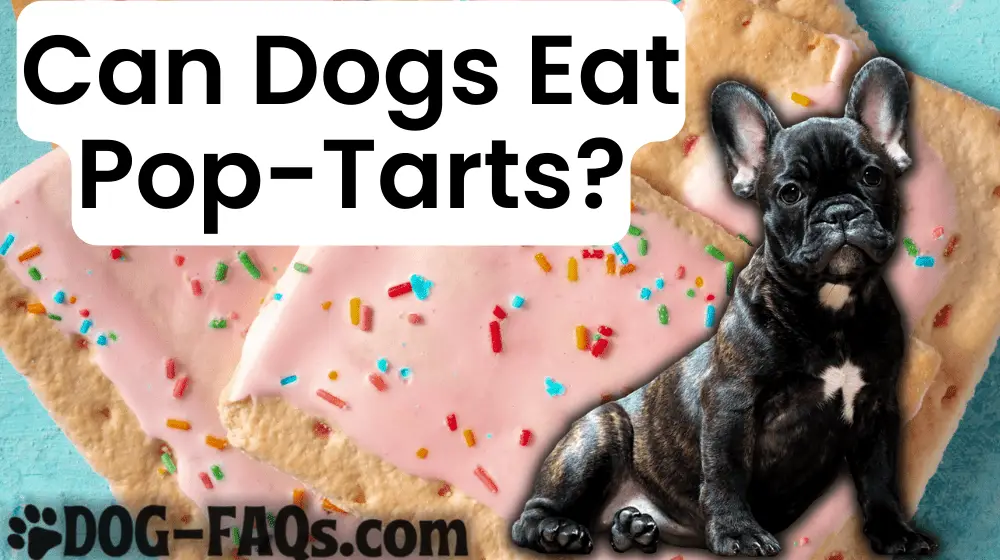Can Dogs Eat Pop Tarts?
While they’re designed for human consumption, your pup may be tempted to sneak a bite of your Pop Tart. But before letting them indulge, it’s important to know if Pop Tarts are safe for dogs.
So, can dogs eat Pop Tarts? Unfortunately, it’s not the best idea. Pop Tarts contain high levels of sugar, salt, carbohydrates, fats, and calories – all of which can be harmful to your dog’s health. Some Pop Tarts also may contain xylitol, which is toxic to dogs.
Can Dogs Have Pop Tarts?
The answer to this question depends on the ingredients that the Pop Tarts contain. In general, dogs should not be allowed to eat the crust or glaze that comes with Pop Tarts as they are full of sugar and could lead to health issues like obesity. However, if the filling contains only fruits and nuts, then it is generally safe for dogs to eat in small quantities.
It is important to note that some Pop Tart flavors contain ingredients that are toxic to dogs, such as chocolate and xylitol. Before giving your pup, any Pop Tart treats, it is important to read the ingredient list carefully and ensure that there are no dangerous additives.
What are Pop Tarts?
Pop Tarts are a type of pre-baked toaster pastries manufactured by Kellogg’s. They were first released in 1964 and have become one of the most popular breakfast items in the United States. Pop Tarts come in a variety of flavors, including strawberry, brown sugar cinnamon, and blueberry.
So what are Pop Tarts made of? On the outside, Pop Tarts have a pastry crust with a sugary glaze. Inside, they are filled with a variety of ingredients depending on the flavor. Common fillings include jam, jelly, frosting, syrup, and a variety of fruits and nuts.
The majority of the Pop Tarts are coated with sugary frosting.
Pop-Tart flavors vary by country and brand, but some of the most common flavors include:
- Strawberry
- Blueberry
- Brown Sugar Cinnamon
- S’mores
- Chocolate Chip Cookie Dough
- Chocolate Fudge
- Cinnamon Roll
- Peanut Butter
- Wild Cherry
- Apple Cinnamon
- Hot Fudge Sundae
- Chocolatey Caramel
- Frosted Chocolate Mocha
- Raspberry
- Frosted Cookies & Cream
- Frosted Peanut Butter Cup
- Frosted Chocolate Strawberry
- Frosted S’mores
Please note that the availability of flavors may vary by region and change over time.
What are Pop Tarts made of?
Pop Tarts are a brand of pre-baked, ready-to-eat pastries filled with jam, jelly, or fruit filling and frosted with icing. The pastry is made from wheat flour, vegetable oil shortening, sugar, salt, and some preservatives. Some Pop Tart varieties also contain eggs and milk.
They come in a variety of flavors, including strawberry, blueberry, brown sugar cinnamon, and chocolate chip, among others. While they may be convenient for humans to enjoy on the go or as a quick breakfast or snack alternative, it’s not recommended that you share them with your pup as they are not formulated to meet their nutritional needs, nor do they provide any health benefits for dogs.
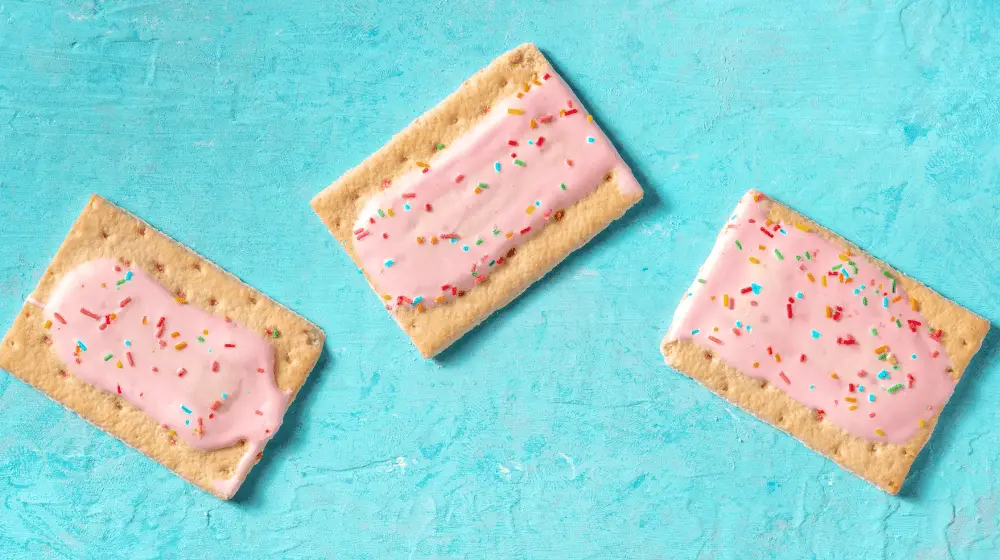
Can Dogs Eat Strawberry Pop Tarts?
No, dogs can’t eat strawberry Pop Tarts! Regarding strawberry Pop Tarts specifically, you should consider the added sugar content in the frosting. There is approximately 10g of sugar per serving in strawberry Pop Tarts, which is far too much for a dog to handle. Additionally, many strawberry Pop Tart flavors contain artificial sweeteners, which can be toxic to dogs if ingested in large quantities.
For these reasons, it is best to avoid feeding your pup any strawberry Pop Tarts. While small amounts may not cause any serious harm, it is best to err on the side of caution when it comes to your pet’s health.
Frosted Strawberry Pop Tarts consist of an outer pastry crust that is filled with a strawberry-flavored filling.
Strawberry Pop Tarts contain a variety of ingredients that can be potentially harmful to dogs if ingested. The primary ingredients are:
- Enriched Flour (Wheat Flour, Niacin, Reduced Iron, Thiamin Mononitrate [Vitamin B1], Riboflavin [Vitamin B2], Folic Acid)
- Sugar
- Soybean and Palm Oil with TBHQ for freshness
- Dextrose
- Contains 2% or less of:
- Salt
- Leavening (Baking Soda, Sodium Acid Pyrophosphate, Monocalcium Phosphate)
- Modified Corn Starch
- Corn Syrup
- Strawberry Juice Concentrate
- Natural and Artificial Flavor
- Red 40
- Soy Lecithin
- Frosting:
- Sugar
- Palm Oil
- Skim Milk
- Artificial Flavor
- Artificial Color (Red 40, Blue 1)
- Glaze:
- Sugar
- Corn Syrup
- Water
- Natural and Artificial Flavor
- Red 40
- Blue 1
- Chocolate flavored drizzle:
- Sugar
- Fractionated Palm Kernel Oil
- Cocoa Processed with Alkali
- Soy Lecithin
- Artificial Flavor
*Note: Ingredients may vary by country and brand
In addition, the product contains specialized glaze and icing packet mixers containing sugar and modified food starch. All these components combined make up a tasty pastry that should not be fed to your dog as it could result in serious health issues such as digestive upset or even more severe reactions like an allergic reaction due to the various artificial colors used in its production.
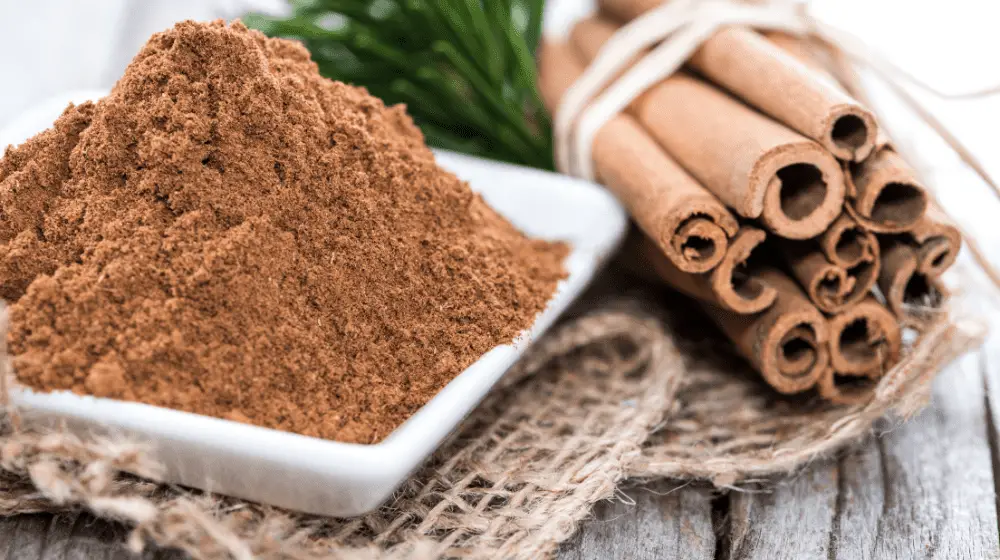
Can dogs eat brown sugar cinnamon Pop Tarts?
No, dogs can’t eat Cinnamon Pop Tarts with brown sugar. Brown sugar cinnamon Pop Tarts are not a safe food for dogs because they contain ingredients that can be toxic or even fatal if ingested. The main ingredient in these treats is sugar and while some small amounts of sugar may not harm your pup, large quantities can cause vomiting, diarrhea, and other digestive issues.
Also, brown sugar cinnamon Pop Tarts contain artificial sweeteners like xylitol which can be especially dangerous for dogs. Xylitol causes low blood pressure and seizures in dogs, so it’s best to avoid feeding them any type of pop tart altogether.
Brown sugar cinnamon Pop Tarts are high in sugar and calories and can contribute to weight gain and other health problems in dogs if fed to them regularly. It is best to stick to a diet specifically formulated for dogs and to avoid giving them human foods.
You surely don’t want your lovely dog to eat some of the ingredients below. Almost all of them are harmful to dogs.
Ingredients for Brown Sugar Cinnamon Pop Tarts:
- Enriched Flour (Wheat Flour, Niacin, Reduced Iron, Thiamin Mononitrate [Vitamin B1], Riboflavin [Vitamin B2], Folic Acid)
- Sugar
- Soybean and Palm Oil with TBHQ for freshness
- Dextrose
- Contains 2% or less of:
- Salt
- Leavening (Baking Soda, Sodium Acid Pyrophosphate, Monocalcium Phosphate)
- Modified Corn Starch
- Corn Syrup
- Brown Sugar
- Cinnamon
- Natural and Artificial Flavor
- Soy Lecithin
- Frosting:
- Sugar
- Palm Oil
- Skim Milk
- Artificial Flavor
- Artificial Color (Yellow 5, Red 40)
- Glaze:
- Sugar
- Corn Syrup
- Water
- Natural and Artificial Flavor
- Artificial Color (Yellow 5, Red 40)
**Please note that ingredients may vary by brand
Can dogs eat S’mores Pop Tarts?
No, dogs should not eat S’mores Pop Tarts. While some human foods like plain toast or boiled chicken are safe for dogs to eat, the sugar and other ingredients contained in a S’more Pop Tart may be too much for their digestive system. Even if your pup loves sweets, it’s best to avoid giving them anything that contains chocolate, marshmallows, or graham crackers, as these snacks are high in sugar and can cause an upset stomach. If you want to give your dog a special treat, try something specifically designed for canine consumption, such as healthy dog treats with natural flavors and no added sugars.
S’mores Pop Tarts ingredients structured in a list:
- Enriched Flour (Wheat Flour, Niacin, Reduced Iron, Vitamin B1 [Thiamin Mononitrate], Vitamin B2 [Riboflavin], Folic Acid)
- High Fructose Corn Syrup
- Dextrose
- Soybean and Palm Oil (with TBHQ for freshness)
- Graham Flavored Filling
- Corn Syrup
- High Fructose Corn Syrup
- Graham Cracker Crumbs (Whole Wheat Flour, Sugar, Soybean and/or Canola Oil, Honey, Baking Soda, Salt)
- Modified Cornstarch
- Contains 2% or Less of:
-
- Salt
- Natural and Artificial Flavor
- Soy Lecithin
-
- Marshmallow Flavored Filling
- Corn Syrup
- High Fructose Corn Syrup
- Water
- Modified Cornstarch
- Contains 2% or Less of:
-
- Natural and Artificial Flavor
- Salt
- Sodium Benzoate and Potassium Sorbate [Preservatives]
- Red 40
- Blue 1
-
- Glaze (Sugar, Water, Corn Starch, Modified Corn Starch, Natural and Artificial Flavor, Red 40, Blue 1)
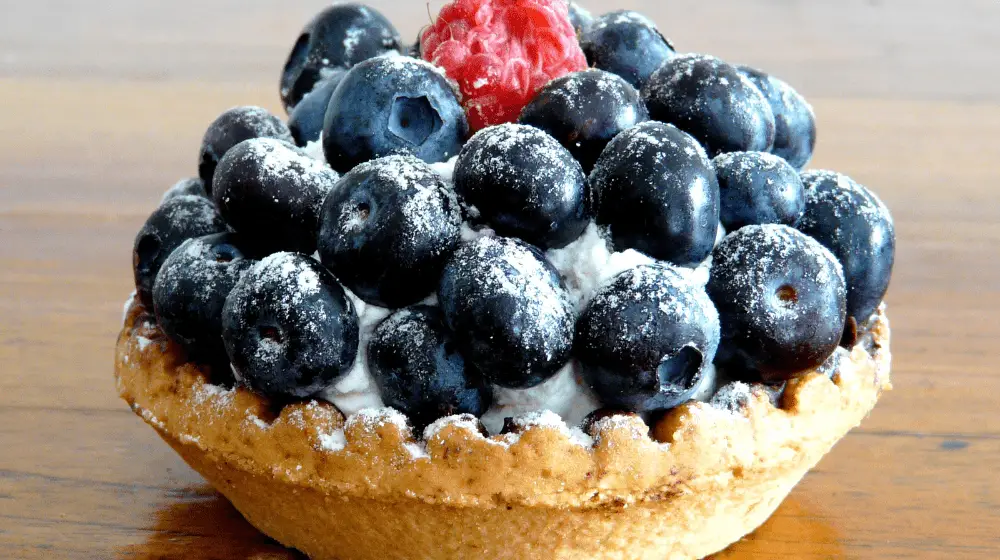
Can dogs eat blueberry Pop Tarts?
In addition to the main ingredients, blueberry Pop Tarts also have a lot of sugar and wheat products. The flavor comes from artificial blueberry flavoring and dried grapes. Unfortunately, even though they may seem like a tasty treat, it is not safe for your dog to eat them due to the presence of grapes.
Grapes are toxic to dogs and can cause kidney failure if consumed in high quantities regularly. It is best to avoid feeding your pup any type of Pop Tart. Alternatively, you can give them healthier snacks such as apple slices or carrots with peanut butter.
Here is the ingredients list for Kellogg’s Frosted Blueberry Pop-Tarts:
- Enriched Flour (Wheat Flour, Niacin, Reduced Iron, Vitamin B1 [Thiamin Mononitrate], Vitamin B2 [Riboflavin], Folic Acid)
- High Fructose Corn Syrup
- Dextrose
- Soybean and Palm Oil (with TBHQ for freshness)
- Blueberry Flavored Filling (Corn Syrup, High Fructose Corn Syrup, Blueberries, Modified Cornstarch, Contains 2% or less of Salt, Citric Acid, Natural and Artificial Flavor, Sodium Benzoate, and Potassium Sorbate [preservatives], Blue 2, Red 40, Red 40 Lake)
- Glaze (Sugar, Water, Corn Starch, Modified Corn Starch, Natural and Artificial Flavor, Red 40, Blue 1)
Contains wheat and soy; may contain milk ingredients.
It is obvious that the different varieties of Pop Tarts above share many of the same main ingredients:
Enriched flour and bleached wheat flour are ingredients commonly found in processed foods like Pop Tarts, and they can be incredibly unhealthy for dogs. Eating foods containing these types of flours may cause digestive issues that range from mild upset stomach to serious gastric distress.
Additionally, regular consumption of these flours can develop a wheat allergy in your dog, which can be very uncomfortable for them.
Here are some common signs of a wheat allergy in dogs:
- Itchy skin
- Hives or red, irritated skin
- Chronic or recurrent ear infections
- Hot spots or moist, infected areas on the skin
- Recurrent skin or ear yeast infections
- Vomiting
- Diarrhea
- Gas or bloating
- Recurrent anal itching
- Recurrent urinary tract infections
- Food allergies can cause a variety of signs and symptoms, and not all dogs will exhibit the same signs.
**It’s important to note that other conditions can also cause these symptoms, so it’s important to consult with a veterinarian to determine the cause of your dog’s symptoms. A food trial with a limited ingredient diet can help to diagnose a food allergy.
While wheat allergies are not common in dogs, some may develop an allergy to wheat after being exposed to it frequently. If your dog does have a wheat allergy, it’s important to avoid giving them Pop Tarts or any other food that contains wheat.
If you are still unsure if your dog has a wheat allergy, it is best to take them to the vet. The vet can do examinations and tests to determine whether or not your pup has an issue with wheat or gluten.
Depending on the results of these tests, they suggest avoiding giving your dog any treats made with wheat and gluten products such as Pop Tarts.
Pop Tarts contain high levels of sugar and artificial flavors, which is not ideal for your dog’s diet. The wheat flour in Pop Tarts could also cause digestive problems in some dogs.
It is best to avoid feeding your pooch Pop Tarts as there are many other healthy foods that you can provide instead.
In addition to providing protein from meat sources, it’s important to ensure that you include vegetables and canine-friendly grains into their diets. Vegetables such as carrots, broccoli, green beans, and sweet potatoes are all excellent choices for adding fiber to a pup’s diet while still providing the essential vitamins and minerals they need to stay healthy.
Dextrose, sugar, corn syrup along with high fructose corn sugar are types of sugar that dogs shouldn’t eat.
These four types of sugar are unhealthy for dogs to consume in large amounts. Dogs have no nutritional need for added sugars, as they do not provide any essential vitamins or minerals. Additionally, too much sugar can cause weight gain and even lead to obesity in some cases.
This is because the body processes these sugars quickly, leading to a spike in insulin levels which can cause the dog to become overweight or obese if consumed over time.
Furthermore, high fructose corn syrup has been linked with an increased risk of diabetes and other health issues in dogs due to its high concentration of glucose molecules. You must limit your pup’s intake of Pop Tarts, and other sugary snacks as too much can be dangerous for their health with conditions like:
- Dental problems: dental decay, cavities, and gum disease, to mention a few.
- Pancreatitis.
- Diabetes.
- Insulin resistance.
- Weight gain.
In reality, dogs don’t have any need to eat sugar. They are able to get it from the carbohydrate content of their daily dog food.
Soybean and palm oil containing TBHQ are dangerous for dogs.
It’s not a wise choice to give your dog Pop Tarts if they have a soybean allergy. Soybean oil has more saturated fats compared to other edible oils. To keep our furry companions healthy, palm oil and soybean oil should be avoided.
Omega-3 fatty acids from flaxseed, fish oil or coconut oil are beneficial for a dog’s skin, coat and joints. Olive oil can also enhance their immune system and offer antioxidants that help prevent infection and illness.
Pop Tarts contain an artificial preservative called TBHQ, which stands for tertiary butylhydroquinone. This preservative is made from soybean and palm oil and is used to keep Pop Tarts fresh for longer.
While it may not be harmful to humans, it can cause serious problems for dogs if they consume large amounts. As a pet owner, it’s important to be aware of what you feed your pup and avoid giving them Pop Tarts.
It’s essential to be mindful when selecting snacks for your four-legged friend, particularly if they contain TBHQ or any other ingredients that could be potentially dangerous.
To safeguard your pup, make sure to read the label thoroughly for any strange or hazardous components prior to offering them anything containing such ingredients.
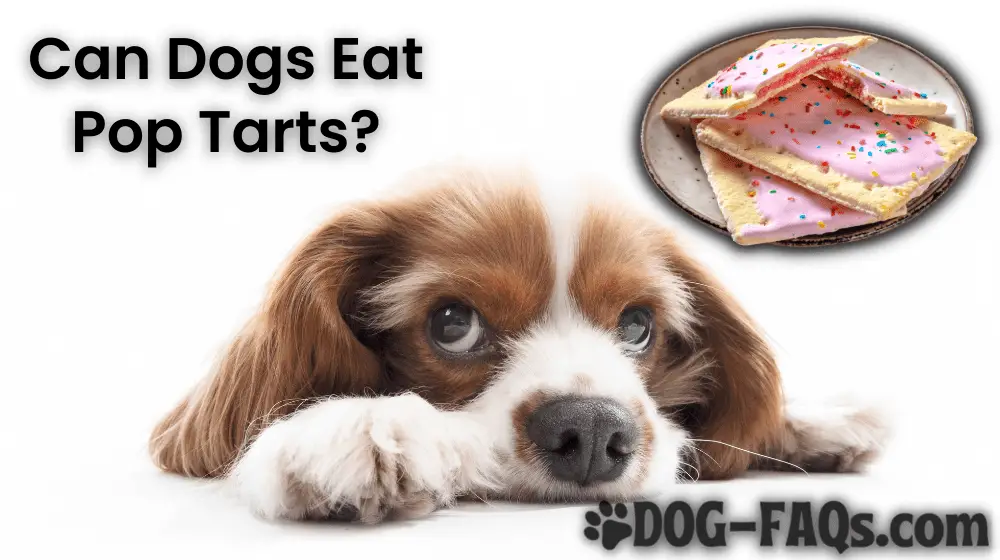
Are Pop Tarts bad for dogs?
Unfortunately, yes. Pop Tarts contain a lot of sugar and fat, which can be very unhealthy for your pup. While some dogs may not be affected by eating them, it is essential to remember that if consumed in large amounts over time, they can lead to health issues such as obesity and diabetes.
Even worse, the artificial colors found in Pop Tarts have been linked to cancer in certain cases. In addition, the preservatives used to keep them fresh are known to cause digestive problems like diarrhea or vomiting when ingested by cats and dogs alike.
So while a bite here or there might not do much harm, it’s best to avoid feeding your pet this sweet treat altogether!
Can Dogs Eat Poptarts?
Dogs should never consume Poptarts as they contain potentially harmful ingredients to canine health. These ingredients include high levels of sugar and salt, both of which could cause upset stomachs or worse if consumed in large quantities by your pup.
Also, some Pop Tart flavors contain chocolate chips or cocoa powder, both of which are toxic to dogs and must be avoided at all costs. If you’re looking for something sweet to give your dog as a treat or reward, opt instead for healthy snacks like fresh fruits, vegetables, boiled chicken breast chunks, a plain yogurt with berries mixed in – anything without added sugar or artificial sweeteners.
In Conclusion: Can Dogs Eat Pop Tarts?
The answer to the question of whether dogs can eat Pop Tarts is a resounding no! Pop Tarts are made primarily with wheat flour and sugar and contain potentially dangerous additives, like xylitol and chocolate, that are not healthy for dogs.
While some Pop Tart flavors may contain safe ingredients for dogs (such as fruits and nuts), it is important to read labels carefully before giving them to your pup.
Furthermore, Pop Tarts’ high levels of fat and sugar may result in an upset stomach or worse for your pup.
If you want to give your dog something sweet, the best approach is to opt for treats specifically designed for canine consumption, like those from pet stores or online retailers.

